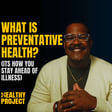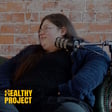
83,000 Lives Lost to Health Inequity: Dr. George Rust | The Healthy Project
83,000 Americans die needlessly every year due to health inequity and systemic racism in healthcare. Dr. George Rust has spent 40 years fighting health disparities in America's most underserved communities, from migrant farmworker clinics in rural Florida to leading public health initiatives during the COVID-19 pandemic.
In this powerful conversation, Dr. Rust reveals the structural inequities, racial health gaps, and preventable suffering he's witnessed throughout his career in medicine and public health. He shares hard-won lessons about earning trust in marginalized communities, navigating cultural competency challenges, and building coalitions for systemic change in American healthcare.
THE REAL COST OF HEALTH INEQUITY: Research shows that eliminating the Black-white gap in health outcomes would save 83,000 lives annually. In Atlanta alone, closing premature death rates between Black and white populations would restore 43,000 person-years of life every year to Black communities. These aren't just statistics—they represent grandmother-years, wisdom-years, and family-years lost to needless suffering caused by barriers to healthcare access, discrimination in medicine, and social determinants of health.
KEY TOPICS IN THIS EPISODE:
- Why health disparities persist in American healthcare and how systemic racism drives preventable deaths
- The concept of "trust adjacency" and how healthcare providers earn trust in communities of color
- What 40 years serving underserved populations taught one doctor about cultural humility and respect in medicine
- How COVID-19 exposed America's public health vulnerabilities and political interference in science
- The difference between "me all vs. we all" – individual autonomy versus community responsibility in public health
- Real stories of needless suffering: from the $500 hand surgery barrier to cervical cancer from lack of pap smears
- Lessons from Morehouse School of Medicine, Dr. David Satcher, and Dr. Louis Sullivan on health justice
- Why respect matters more than you think in clinical settings and the "Lou Sullivan name tag" story
- The Tallahassee measles case and what happens when ideology trumps evidence-based medicine
- How to avoid physician burnout while fighting for social justice and health equity
- Building coalitions and community partnerships for sustainable systemic change
ABOUT DR. GEORGE RUST: Dr. Rust is a public health physician and professor at Florida State University with over 40 years of experience in community health, health policy, and medical education. His career spans Cook County Hospital in Chicago, the Farmworker Health Association in rural Florida, and 25 years at Morehouse School of Medicine, where he worked alongside public health legends Dr. David Satcher (former U.S. Surgeon General) and Dr. Louis Sullivan (founding president of Morehouse School of Medicine and former Secretary of Health and Human Services).
His new book, "Healing in a Changing America: Doctoring a Nation of Needless Suffering" (Johns Hopkins University Press), examines how America's healthcare system creates preventable suffering through structural inequities, racial discrimination, and barriers to healthcare access. The book offers a roadmap for achieving health justice and eliminating health disparities across race, class, and geography.
WHY THIS MATTERS NOW: America is undergoing demographic transformation into a multicultural, pluralistic democracy, yet health inequities continue to widen. With political polarization affecting public health policy, attacks on diversity initiatives in medical education, and ongoing debates about vaccine mandates, quarantine protocols, and government intervention in healthcare, this conversation offers critical insights for healthcare professionals, policy makers,



